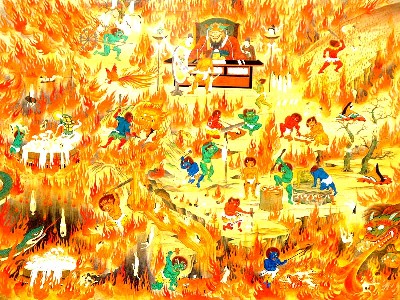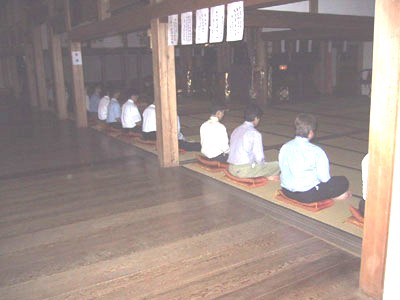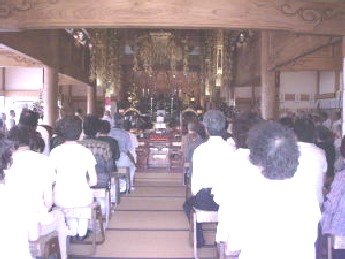![]() Home
Home ![]() Site map
Site map ![]() E-mail to me
E-mail to me
![]() Links
Links
 |
To-day, there is probably not a man, or woman in The West, who does not know Zen in Japanese word. Though most of The Japanese can not possibly gain the forces of Zen, most of The Westerners tend to conceive that only Zen is Japanese religion, and an effort to understand the essence of Zen encounters various problem, which will be raised by inenarrable factors. And so, there would have been so much mystification in The West in regard to Zen, and you never know Nenbutsu. |  |
|
| Purgatory in Hell | Zen |
In case of moving to another place, Parent Cats holds their child in their mouth, but Child Monkey has to cling to mother's body. Figuratively speaking of Japanese religion, it can be classified into two groups, that is, entrusting to what you believe like kitten is leading to Nenbutsu, seeking for what you believe like Child Monkey means Zen. Probably you don't know Nenbutsu because Nenbustu has been interpreted as a kind of incantation among foolish folks by Japanese highbrow.
| About Sinto Shinto has no established system such as originator, religious community and tenet defined. And so, most of The Japanese don't clearly recognizes Shinto as religion. Therefore, Shinto is custom rather than religion in Japan. (For example, there are altars of both Shinto and Buddhism in most Japan's homes.) |
Hell, this word would be the crucial point for understanding Nenbutsu because most of The Japanese subconsiously think that bad guys will fall into the pit of the Hell after his death, and that is also the very point which can determinately separate the thought of The Japanese from the thought of The Chinese.
In ancient China, a good man died in poverty, and a bad guy succeeded in his life. How do you interpret ?. Though there is no complete translation in English, Sima Qian said that God's animosity is correct or is not. (In short, he said that I can not understand). No episode in all history of China and Japan illustrates more completely essential difference of thought, with its underlying environments, than this fable.
Though I don't know the
interpretation in Christendom, most of Japanese would interpret
the above fable as follows.
Certainly, a bad guy made an fortune in his life, but he will
fall into hell after his death. Good humans only will be able to
go into reincarnated heaven after his death, and average guys may
be reincarnated as animals. (Example: dog, cat)
What are you subconsiously afraid of ?. The most of the Japanese are unconsciously afraid of the falling into hell after death, and that is leading to birth of Nenbutsu.
| Except for
Zen sects, Japanese people must say over and over again
same phrase, Nembutsu, in religious rite, and there is
various phrase according to Buddhism sects. (Example in
Japanese : Na-mu ami dabutsu, Na-n maida, na-mu myou
horen gekyou.) However, the features that all Nembutsu
contains are that classical Sanscrit in India had been
translated into Japanese Kanji Symbols. Although Nembutsu would be foolish pagan notion to The westerners, it is still unconsciously engraved on The Japanese people minds not only for the multitudes, but also of many who pride themselves on their high education and liberal sentiments. And so, on the verge of death, most of The Japanese probably would say same phrase, Nenbutsu. Though it may be inadequate, the meaning of Japanese Nenbutsu is as follows. 1. Na-mu ami dabutsu
= I deeply believe and greatly appreciate abysmal
Wisdom and infinite Mercy of Buddha |
 |
As mentioned previously, The Japanese are afraid of the falling into Hell after death and they say same phrase, Nenbutsu, wishing to go to Heaven. As an inherent thought of Buddhism in Japan, Hell would be the most important factor, that is, I think that Nenbutsu was born as the confluence of Buddhism and image of Hell native to Japan
http://www.jodo.org/teachings/nembutsu.html (You can listen Nenbutsu on this web page)